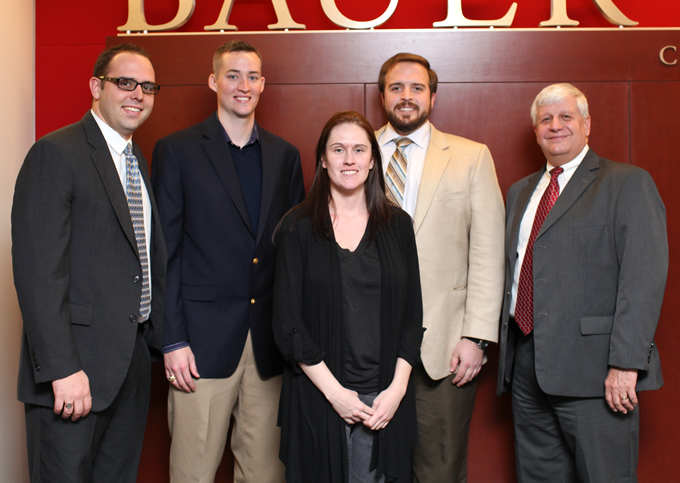Graduate Real Estate Students Win Spot In ULI/Hines Design Competition
Students from Bauer and Hines Colleges Submit Proposal for Old Downtown Houston Post Office; Winner to be Announced in April
Published on February 13, 2012

The University of Houston's team for the 2012 Urban Land Institute/Gerald D. Hines Urban Design Competition includes Tiger Lyon, David Ladewig, Ashleigh Rogers and Keith Richards. (Team member Brian Ferguson is not shown). Professor Charles Savino (far right) taught the graduate-level Finance course through Bauer College, in which the group laid the groundwork for the competition.
A team of five graduate students from the University of Houston has won a spot in the 2012 Urban Land Institute/Gerald D. Hines Urban Design Competition.
Recently, they have spent long hours and sleepless nights working on a project that happens to be right down the street and could be of lasting value to the city. As luck would have it, the prestigious, graduate-level urban-design competition picked downtown Houston’s landmark U.S. Post Office as the focus of its theoretical land-use project.
It’s the first time in the 10-year history of the Washington-based competition that a team from the University of Houston will participate. The five MBA students from the C. T. Bauer College of Business and MS Architecture candidates from the Gerald D. Hines College of Architecture had 15 days to formulate plans for the historic 16.3-acre post office site at 401 Franklin Street. The teammates, all of whom attend grad school full time, submitted their proposal for the urban-development project on Jan. 31 and are awaiting a response from the jury.
During the week of Feb. 20, four finalists will be chosen from 151 multi-disciplinary teams representing 64 schools in the United States and Canada. The winner will be announced April 6 at a Houston ceremony that will also honor Hines, the Houston developer and philanthropist who in 2003 endowed the competition in perpetuity with a $3 million gift.
“It’s got a lot of cache,” John E. Walsh, Jr., director of Bauer College’s Graduate Real Estate Program, says of the competition. “The Urban Land Institute is the most recognized, most respected professional real-estate organization, and Gerald Hines is one of the most respected developers, if not the most respected in the world.”
The winning group will receive a $50,000 cash prize. The three finalists will take home $10,000 each.
The UH group is led by Bauer College’s Keith Richards, a graduate assistant and MBA scholar in the Graduate Real Estate Program. Rounding out the team are David Ladewig, Ashleigh Rogers and Tiger Lyon, all of Hines College, and Brian Ferguson of Bauer. The students did groundwork for the competition in Finance Professor Charles R. Savino’s “Real Estate Studies and Projects” course during Fall 2011 semester.
The competition seeks a long-term vision for a new downtown district with a distinct identity. While based on a hypothetical situation, the project addresses Houston groups’ desire to connect downtown’s redevelopment with its neighborhoods. “The plan is for the property to be sold, and it appears to have potential as a mixed-use development and a central transportation hub,” Walsh says.
The competition also includes teams from University of Texas at Austin, University of Texas at Arlington and Texas A&M.
“We have a very good team. I don’t know if they will win, but they will definitely develop a good case,” Walsh says. “We are in our second year of offering a Graduate Real Estate Certificate at Bauer College, so we are very proud of the fact that a team of students in the real estate program made the competition. That gives us a chance to tell the world about our program and how proud we are of our team.”
Richards, the UH team captain, says his Bauer studies prepared him for the challenge.
“After two weeks of little to no sleep, extreme stress and pressure and having to put my social life on hold, I can now say that I truly understand the value of the education I have received here at Bauer and in the Graduate Real Estate Program,” says Richards, who owns a small real estate brokerage. “I am ready to apply that knowledge and experience to solving real-world problems.”